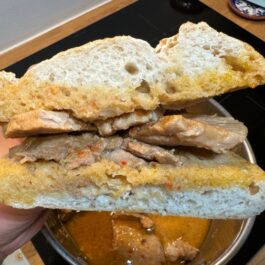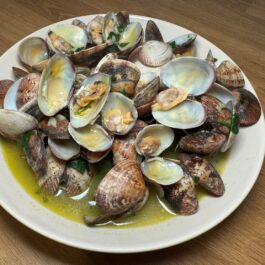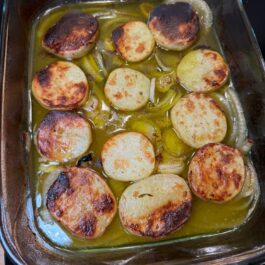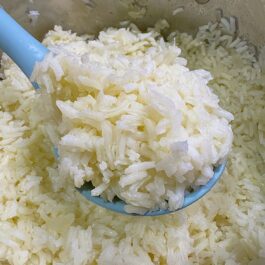The Perfect Polvo Lagareiro: A Classic Portuguese Octopus Recipe
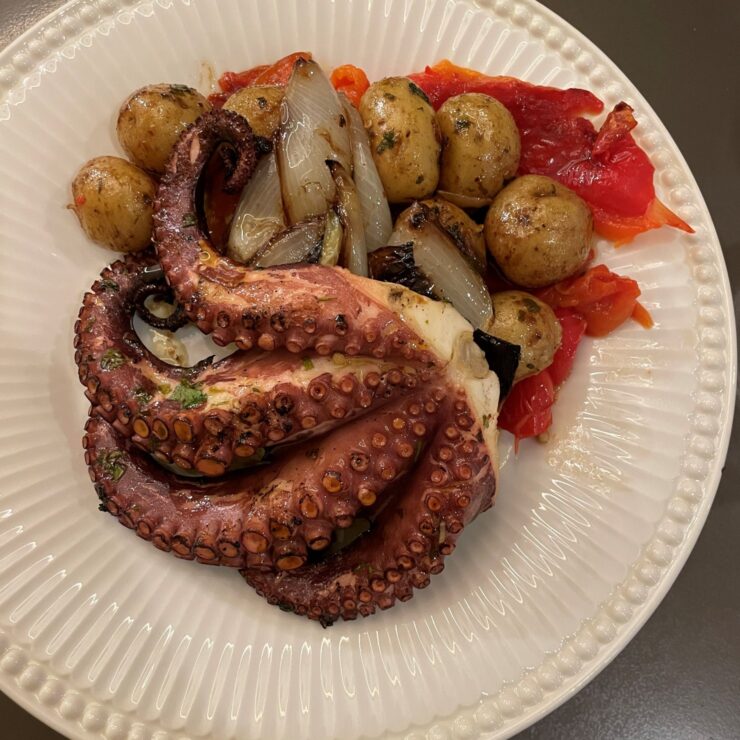
Polvo Lagareiro also known as Baked Octopus
Polvo Lagareiro is a classic Portuguese dish, and one of my favorite Portuguese meals. Found throughout Portugal the dish is known for its simple yet flavorful preparation, highlighting the Mediterranean love for seafood and olive oil. It combines earthy, oceanic flavors with the richness of olive oil, making it a popular choice in Portuguese cuisine. This recipe is a celebration of traditional cooking methods that honor fresh, high-quality ingredients.
Preparing Polvo Lagareiro
The preparation begins with cooking the octopus until tender, typically achieved by simmering it in a pot with water, onions, bay leaves, and sometimes a splash of vinegar or wine (optional). This step ensures the octopus remains moist and tender while absorbing aromatic flavors. Meanwhile, baby potatoes are boiled until soft, then coated in olive oil and roasted in the oven for a beautifully crispy texture. The dish’s distinct aroma comes from generous amounts of peppers, onions, and garlic sautéed in olive oil.
After the octopus is cooked, it is arranged in a baking dish alongside the prepped potatoes. The entire dish is roasted until golden, allowing the potatoes to crisp up and the octopus to develop a slightly charred exterior. This step brings out the dish’s signature caramelized flavors and elevates its visual appeal. This recipe not only provides a satisfying meal but also offers a glimpse into the heart of Portuguese culinary traditions, celebrating the country’s coastal bounty and love for bold, simple flavors.
Wine Pairings with Polvo Lagareiro
Polvo Lagareiro pairs beautifully with wines that complement its rich olive oil, garlic, and seafood flavors. Here are some excellent choices:
White Wines
- Vinho Verde: A crisp, slightly effervescent Portuguese wine that balances the richness of the dish with its bright acidity.
- Albariño: A zesty white from Spain or Portugal, known for its citrusy notes and subtle salinity.
- Chablis: A mineral-driven French Chardonnay that enhances the seafood’s delicate flavors.
Rosé Wines
- Provence Rosé: A dry rosé with hints of red fruit and herbs that pairs well with both the octopus and the roasted potatoes.
- Portuguese Rosé: Local rosés often have a slightly fuller body, making them a versatile choice for this dish.
Light Red Wines
- Pinot Noir: A lighter-bodied red with earthy and berry flavors that complement the charred, roasted notes of the octopus.
- Beaujolais: A fruity, low-tannin wine from France that doesn’t overpower the dish’s delicate flavors.
These wines balance the boldness of garlic and olive oil while enhancing the tender, briny notes of the octopus.
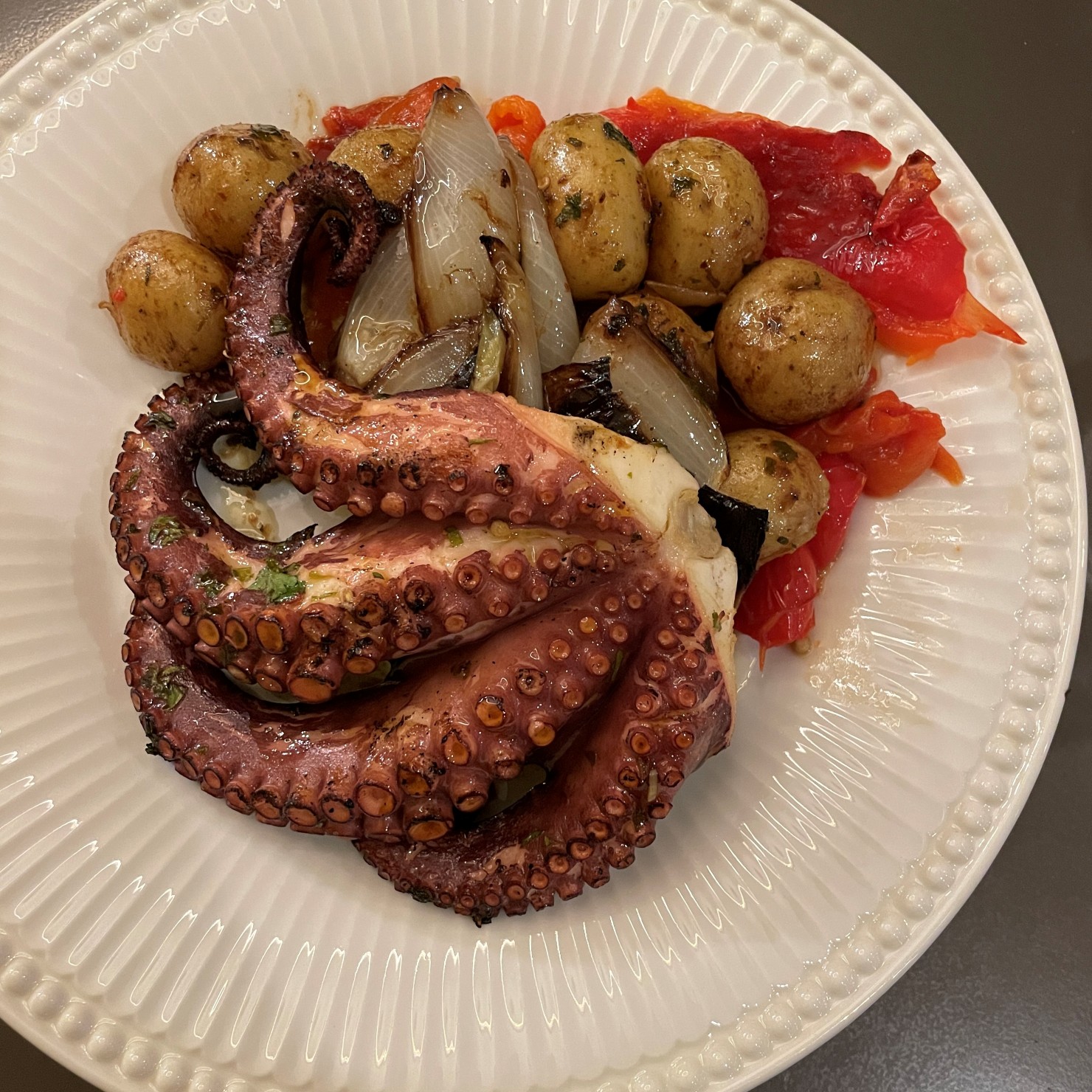
Polvo Lagareiro: Portuguese Roasted Octopus
Ingredients
Octopus
- 2 lbs octopus, can be frozen
- 1 onion, sliced in half
- 1 garlic bulb, sliced in half
- 5 bay leaf
- 10 black peppercorns
- ¼ cup kosher salt, a dried kombu leaf can be used instead to add more character to the dish
Polvo a Lagareiro
- 12 baby yellow potatoes
- 2 red bell peppers
- 1 onion, cut into quarters
- 4 garlic cloves
- 1 tsp paprika, high quality
- extra virgin olive oil, as needed
- salt, to taste
Instructions
Cook the Octopus
- If the octopus is frozen, thaw.
- Set a pot large enough to submerge the octopus on a stove.
- Fill with enough water to submerge the octopus.
- Add onion, garlic, bay leaf, salt, peppercorns to the pot.
- Bring to a boil.
- While the water warms up. Clean the octopus. Remove the eyes and beak from the octopus. You can cut a wedge above and below the eyes to remove. Then you can push out the beak with your fingers from where you made the cuts. Keep the head attached.
- Once the water is boiling, use tongs to securely grab the octopus by the head.
- Dip the octopus 3 times, fully submerging the octopus each time for a few seconds.
- Then submerge the octopus and bring the pot to a light boil. Once it reaches a boil reduce to a simmer and partially cover the pot with a lid.
- Cook the octopus in a strong simmer for 45 minutes.
- While the octopus is cooking we can cook the potatoes in a pot of water and the peppers and onions in a saute pan (see below).
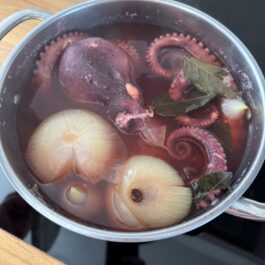 After the 45 minutes are complete, turn off the heat and cover with a lid. Let the octopus rest in the pot for 25 minutes.
After the 45 minutes are complete, turn off the heat and cover with a lid. Let the octopus rest in the pot for 25 minutes.
Potatoes
- Set a pot on the stove and fill with water.
- Add 2 tbsp of salt to the water and bring the water to a boil.
- Once boiling add the potatoes and cook for 10-15 minutes, testing for doneness at 10 minutes. A fork should pierce the potato with little resistance when cooked.
- When the potatoes are done, drain them from the pot and set aside in a bowl or plate.
Peppers and Onions
- Set a large sauté pan on the stove and heat on medium high heat.
- Add olive oil to cover the bottom of the pan. We want a good amount of olive oil to keep the peppers and onions from overcooking and we can use this olive oil in the final plating, saturated with flavor.
- Once the oil is heated, add the peppers, onions, garlic, and paprika.
- Adjust the heat as necessary so that the peppers, onions, and garlic do no burn. Add more olive oil if needed. We want soft, roasted vegetables.
- Cook for 20-30 minutes until soft.
- Optional: peel the skin off the peppers. This skin can be slightly bitter.
Polvo Lagareiro
- Once the octopus, potatoes, peppers, and onions are cooked heat an oven to 435F or 225C.
- On a baking sheet or oven safe glass baking dish place place the potatoes and drizzle olive oil all over. Toss to coat the potatoes evenly.
- Put the potatoes in the oven and roast for 10 minutes.
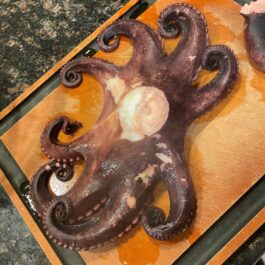 While the potatoes roast, remove the head of the octopus and then cut the tentacles into 4 portions. Coat the tentacles with olive oil. The head can be used in a seafood salad or octopus rice as desired.
While the potatoes roast, remove the head of the octopus and then cut the tentacles into 4 portions. Coat the tentacles with olive oil. The head can be used in a seafood salad or octopus rice as desired.- After the potatoes roast for 10 minutes add the olive oil coated octopus tentacles.
- Roast in the over for 10 minutes.
- If the peppers and onions have cooled, turn on the sauté pan to reheat.
- Once the octopus tentacles have been roasted for 10 minutes remove the potatoes and tentacles from the oven.
- Finish the Polvo a Lagareiro by first plating the potatoes, then layering on the peppers and onions, and last top off with the tentacles. Drizzle the olive oil from the pepper and onion sauté pan.
